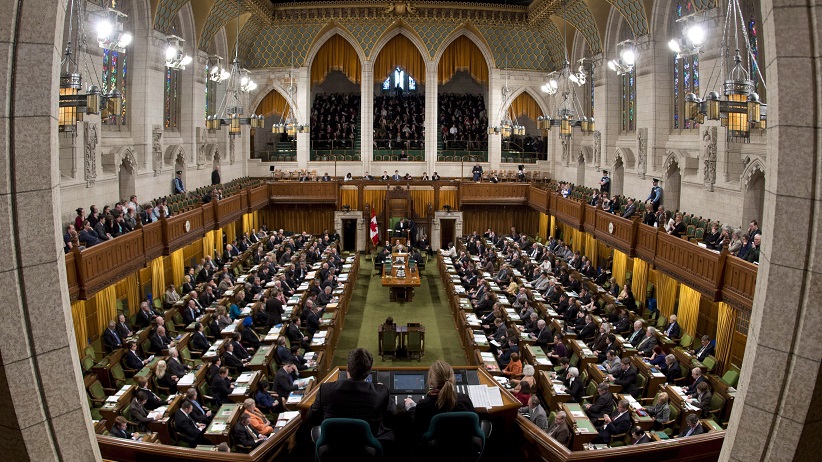Must-see QP: The Tories won’t budge on security oversight
Your daily dose of political theatre
Share

Maclean’s is your home for the daily political theatre that is question period. If you’ve never watched, check out our primer. Today, QP runs from 2:15 p.m. until just past 3. We livestream and liveblog all the action.
The must-see moment
If four prime ministers, five retired Supreme Court judges, three former justice ministers, four past solicitors general, three ex-members of the Security Intelligence Review Committee, two recent privacy commissioners, and a longtime RCMP watchdog all sign a letter, find willing publishers at The Globe and Mail and La Presse, and criticize a sitting government’s direction in the middle of a tremendously important public debate about their country’s safety, whatever they write is news.
“The lack of a robust and integrated accountability regime for Canada’s national security agencies makes it difficult to meaningfully assess the efficacy and legality of Canada’s national security activities,” wrote Jean Chretien, Paul Martin, Joe Clark and John Turner, who roped in a lengthy cast of co-signatories. “This poses serious problems for public safety and for human rights.”
Their problem: Federal anti-terror legislation doesn’t bolster existing oversight of Canada’s security agencies. Their solution: “A strong and robust accountability regime mitigates the risk of abuse, stops abuse when it is detected, and provides a mechanism for remedying abuses that have taken place. In the years since the Arar inquiry, international human rights experts—including the UN Committee against Torture—have called on Canada to improve oversight of its national security agencies.”
The opposition has howled for similar measures for months; indeed, those demands followed, almost immediately, Michael Zehaf-Bibeau’s rampage on Parliament Hill last year. Just today, Liberal MP Wayne Easter, a former solicitor general whose signature is on this afternoon’s letter, raised the issue in the House. Justice Minister Peter MacKay wasn’t inclined to agree with Easter’s point of view. MacKay even suggested that the Liberals once rejected a parliamentary proposal, supported by all parties, that would bolster oversight of security agencies.
Liberals disagree that anybody rejected the proposal, which they say simply died on the order paper before they lost the confidence of the House in late 2005. The group of four PMs recall that sequence of events in their letter.
…efforts to enhance parliamentary oversight of national security agencies have also been unsuccessful. For example, in October 2004, a report calling for parliamentary oversight over national security activities was presented to the minister of public safety; this report contained an oversight structure that was agreed upon by representatives of all parties in both the House of Commons and the Senate. Legislation was introduced at the time, but not adopted before the next election.
The oversight question isn’t lost on Thomas Mulcair’s party, which will oppose Bill C-51 on the grounds that its provisions “could lump legal dissent together with terrorism” and “would give significant new powers to CSIS without addressing serious deficiencies in oversight.”
The government simply isn’t listening, buoyed by popular support for the broad tenets of the bill. The same poll that suggests four in five Canadians support C-51 also says that two-thirds of respondents hope for increased oversight of the people whose job it is to keep everyone safe.
If there’s room for any multi-partisan, popular consensus on universally acceptable improvements to C-51, oversight might offer the only hope. But fat chance that the sitting Conservatives will take any direction from three Liberal prime ministers and a generation’s worth of cabinet ministers whose legacies Harper’s team has spent nearly a decade trying to stifle.
The recap
The context
Four in five dentists approve of Trident, and that’s good enough for anyone who ever bought a pack of spearmint. Now, four in five Canadians approve of Bill C-51, the anti-terror legislation that’s meant to assuage growing concern in Canadian households that their country is less safe than it used to be. That kind of number is good enough for any government that hopes to convince even a majority of its citizens that the politicians in charge are on the right track. Certainly, it only encourages poison-tongued, finger-wagging government supporters to dismiss any opposition to C-51 as soft on terror.
As Stephen Harper’s team champions C-51, and Liberals fall in line, the bill will, inevitably, soon become law. But the NDP refuses to jump onboard, no matter the obvious headaches that come with clear opposition to a popular law-to-be in an election year. Mulcair is making an audacious bet that a bunch of voters, notwithstanding their current support of the government’s public safety agenda, will at least respect the NDP’s principle, understand that their job is to criticize even the most popular measures, eschew any notion that New Democrats are soft on terror, and maybe even see the wisdom in votes against C-51. Easy money, right?